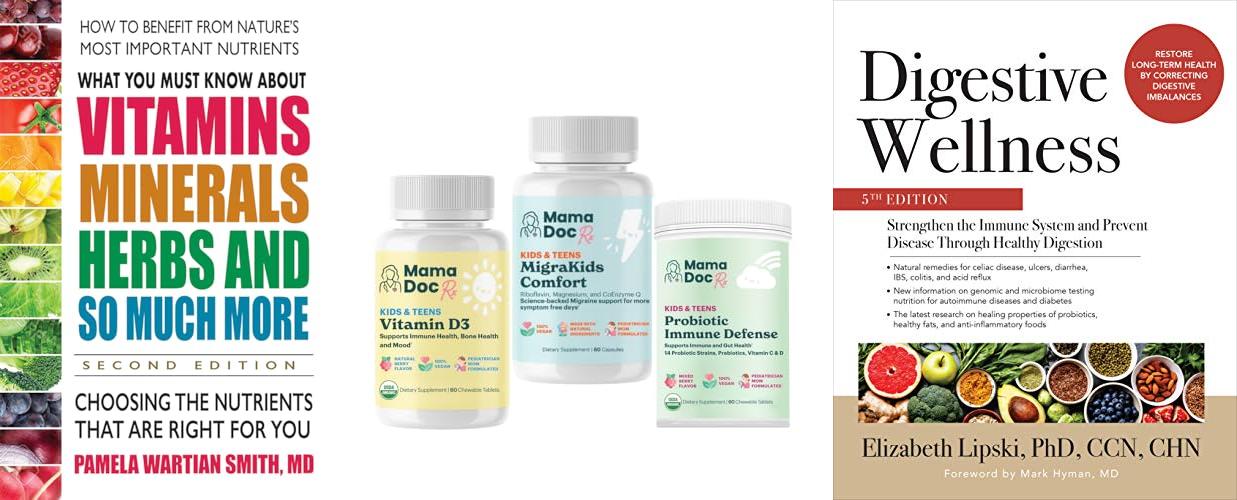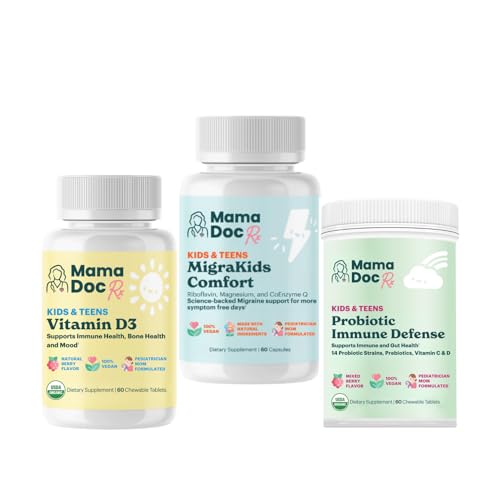Imagine this: you wake up with a throbbing headache that won’t quit. Migraines can make even simple days feel impossible. You’ve tried different medicines, and maybe you’ve heard about probiotics being helpful. But with so many different kinds of probiotics out there, how do you know which one is right for your migraines? It can feel overwhelming, and sometimes you just want a clear answer.
That’s why we’re diving deep into the world of probiotics and migraines. We know you want relief, and finding the right support can make a big difference. In this post, we’ll break down what you need to know. We’ll explore how probiotics might help your migraines and guide you through choosing the best ones for your needs. Get ready to learn how these tiny helpers could be your next step towards fewer headaches.
Our Top 5 Probiotics For Migraines Recommendations at a Glance
Top 5 Probiotics For Migraines Detailed Reviews
1. What You Must Know About Vitamins
Rating: 8.7/10
Navigating the world of vitamins, minerals, and herbs can feel overwhelming. This guide, “What You Must Know About Vitamins, Minerals, Herbs and So Much More: Choosing the Nutrients That Are Right for You,” aims to simplify that journey. It helps you understand what your body needs and how to pick the best supplements to support your health goals. It’s a straightforward resource for anyone looking to make informed choices about their nutrition.
What We Like:
- Presents complex information in an easy-to-understand way.
- Empowers readers to make smart decisions about their health.
- Offers a broad overview of different nutrient types.
- Helps you figure out what might be missing from your diet.
What Could Be Improved:
- Specific, actionable meal plans are not included.
- Could offer more in-depth details on the science behind certain herbs.
- The “so much more” aspect could be explored with more examples.
This book provides a solid foundation for understanding supplements. It’s a valuable tool for anyone wanting to take control of their well-being.
2. MamaDoc Rx Ultimate Migraine Relief Trio
Rating: 9.4/10
The MamaDoc Rx Ultimate Migraine Relief Trio is a special bundle designed to help kids aged 6 and up who experience migraines. It focuses on the connection between your gut and your brain, which scientists think is important for feeling better. This trio includes vitamins and probiotics that work together to support your child’s health and help them have more days without migraines and more time for fun.
What We Like:
- Combines nutrients like Riboflavin, Coenzyme Q10, Magnesium, and Vitamin D with 14 kinds of probiotics.
- Supports the mind-gut connection, which may help with migraines.
- Made with quality and safety in mind, manufactured in GMP-certified facilities and tested for purity.
- Developed by pediatrician moms who care about children’s health.
- Aims to give kids more migraine-free days and more opportunities to play.
What Could Be Improved:
- The product packaging or instructions could be clearer about the specific dosage for different ages within the 6+ range.
- More information could be provided on how long it typically takes to see results.
This trio offers a promising approach to migraine support for children. It’s a well-thought-out product from a brand dedicated to natural and safe health solutions for kids.
3. Digestive Wellness: Strengthen the Immune System and Prevent Disease Through Healthy Digestion
Rating: 9.0/10
Discover the secret to a stronger body and a healthier life with “Digestive Wellness: Strengthen the Immune System and Prevent Disease Through Healthy Digestion, Fifth Edition.” This book guides you on a journey to understand your gut and how it impacts your overall well-being. It teaches you how to eat for better digestion, which in turn helps your body fight off sickness and stay healthy.
What We Like:
- Provides clear, easy-to-understand information about digestion.
- Offers practical tips for improving gut health through diet.
- Explains the connection between a healthy gut and a strong immune system.
- Helps readers learn how to prevent common illnesses.
- The fifth edition is updated with the latest research.
What Could Be Improved:
- Some readers might want more specific meal plans.
- The book could include more visual aids like charts or diagrams.
- More recipes could be added for a variety of dietary needs.
This book is an excellent resource for anyone looking to take control of their health by focusing on their digestion. It empowers readers with knowledge to make better choices for a more vibrant life.
4. Candida Albicans: Natural Remedies for Yeast Infection
Rating: 8.7/10
This book, “Candida Albicans: Natural Remedies for Yeast Infection,” offers a helpful guide for those seeking gentler ways to manage yeast infections. It explores various natural approaches and provides information on how to use them effectively. The book aims to empower readers with knowledge about alternative treatments.
What We Like:
- Presents a variety of natural remedies.
- Explains how to use these remedies.
- Focuses on a less invasive approach to yeast infections.
- The information is easy to understand for many people.
- It encourages readers to take a more active role in their health.
What Could Be Improved:
- Lacks specific scientific studies to back up all claims.
- Does not offer personalized treatment plans.
- Some remedies might require a trip to a special store.
- The book could include more step-by-step instructions for some remedies.
- More visuals or diagrams would be beneficial.
Overall, this book is a good starting point for exploring natural options for yeast infections. It provides useful information, but remember to always consult a healthcare professional for diagnosis and treatment advice.
Probiotics for Migraines: Your Ultimate Buying Guide
Migraines can be tough. They can stop your day in its tracks. Many people are looking for natural ways to manage them. Probiotics are tiny living things that can help your gut. Some research suggests they might also help with migraines. If you’re thinking about trying probiotics for your migraines, this guide will help you choose the best one.
What to Look For: Key Features of Migraine-Friendly Probiotics
When you shop for probiotics for migraines, keep these important features in mind.
- Specific Strains: Not all probiotics are the same. Look for strains that studies have linked to migraine relief. Some common ones include Lactobacillus helveticus and Bifidobacterium longum.
- High CFU Count: CFU stands for Colony Forming Units. This is how many live bacteria are in each dose. A higher CFU count (often in the billions) usually means a stronger probiotic.
- Delayed-Release Capsules: Some probiotics need to survive your stomach acid to work in your gut. Delayed-release capsules help them get to where they are needed.
- Third-Party Testing: This means an independent lab checked the product. It ensures what’s on the label is actually in the bottle. It also checks for purity.
- Reputable Brand: Choose brands that have good reviews and a history of making quality supplements.
Important Materials: What’s Inside Matters
The main “material” in probiotics is the bacteria themselves. These are carefully selected strains. Other ingredients might include prebiotics. Prebiotics are food for the good bacteria. They help the probiotics grow and thrive. You might also see fillers or binders, but these should be minimal. Always check the ingredient list.
Factors That Improve or Reduce Quality
Several things can make a probiotic better or worse.
- Quality of Strains: The specific types of bacteria and how they are grown are very important. High-quality strains are more likely to be effective.
- Manufacturing Process: How the probiotic is made affects its potency. Good manufacturing practices ensure the bacteria stay alive and active.
- Storage and Handling: Probiotics are living things. They need to be stored correctly. Heat and moisture can kill them. Look for brands that offer good storage advice or even refrigerated shipping.
- Expiration Date: Always check the expiration date. An expired probiotic may not have live bacteria.
Poor quality control, poor storage, or using ineffective strains will reduce the quality of the probiotic.
User Experience and Use Cases
People try probiotics for migraines for different reasons. Some hope to reduce how often they get migraines. Others want to lessen the pain when a migraine hits. Some also hope to improve their overall gut health, which they believe is connected to migraines.
- Consistency is Key: Many users find that probiotics work best when taken regularly. It might take a few weeks or months to notice a difference.
- Listen to Your Body: Everyone’s body is different. What works for one person might not work for another. Pay attention to how you feel.
- Combine with Other Strategies: Probiotics are often part of a bigger plan to manage migraines. This might include diet changes, stress management, and good sleep.
- Talk to Your Doctor: It’s always a good idea to talk to your doctor before starting any new supplement, especially if you have a health condition or take other medications.
Frequently Asked Questions: Probiotics and Migraines
Q: Can probiotics really help with migraines?
A: Some studies show a link between gut health and migraines. Certain probiotic strains might help reduce migraine frequency or severity for some people. More research is needed, but it’s a promising area.
Q: Which probiotic strains are best for migraines?
A: Strains like *Lactobacillus helveticus*, *Bifidobacterium longum*, and *Lactobacillus paracasei* have shown promise in some studies related to migraine management.
Q: How long does it take to see results from probiotics for migraines?
A: It can vary. Some people might notice changes in a few weeks, while others may need a few months of consistent use to see benefits.
Q: Are there any side effects to taking probiotics for migraines?
A: Most people tolerate probiotics well. Some might experience mild gas or bloating when they first start. These usually go away.
Q: Should I take probiotics with food?
A: It depends on the product. Some probiotics are best taken on an empty stomach, while others are fine with food. Check the product label for specific instructions.
Q: Can I take probiotics if I have a sensitive stomach?
A: Yes, many people with sensitive stomachs find probiotics helpful for improving gut health. Starting with a lower dose might be a good idea.
Q: Are all probiotic supplements the same?
A: No, they are not. Probiotics differ in the strains of bacteria they contain, the number of CFUs, and the quality of the manufacturing process.
Q: Do I need a prescription for probiotics?
A: No, most probiotics are available over-the-counter. You don’t need a prescription to buy them.
Q: Can I stop taking my migraine medication if I start probiotics?
A: Never stop taking prescribed medication without talking to your doctor. Probiotics are usually seen as a complementary approach, not a replacement for medical treatment.
Q: Where can I buy good quality probiotics for migraines?
A: You can find them at pharmacies, health food stores, and online retailers. Always buy from trusted sources and check reviews.
In conclusion, every product has unique features and benefits. We hope this review helps you decide if it meets your needs. An informed choice ensures the best experience.
If you have any questions or feedback, please share them in the comments. Your input helps everyone. Thank you for reading.
Hi, I’m Robert Contreras, a passionate archery instructor based in the USA. With years of experience under my belt, I’ve dedicated my life to mastering the art of archery and sharing its intricacies with enthusiasts of all levels. Through my website, 10Bows.com, I invite you to explore a treasure trove of tips, techniques, and personal insights that reflect my journey in the world of archery. Whether you’re picking up a bow for the first time or refining your skills, I’m here to help guide you toward precision, focus, and a deeper appreciation for this timeless sport.




